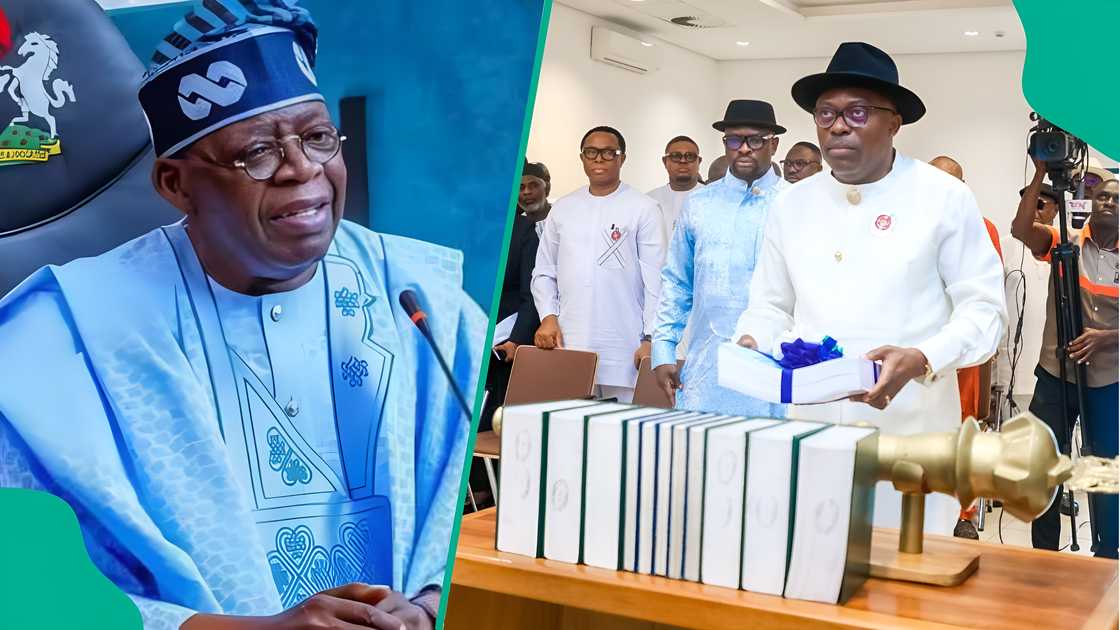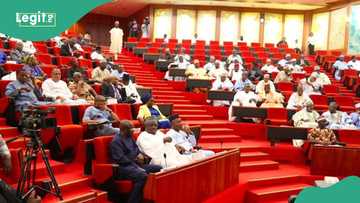Why President Tinubu Cannot Sign the Rivers State Budget into Law, by Opatola Victor
Editor's note: In this piece, Opatola Victor offers his professional interpretation of Sections 11(4) and 305 of the Constitution and uses it to explain why the President lacks constitutional authority to sign the Rivers State budget.
Under Nigeria’s constitutional arrangement, the federal and state governments operate within clearly defined jurisdictions and powers. The powers and responsibilities assigned to each tier are not only distinct but also deliberately separated to prevent institutional overreach and to preserve the country’s delineation of powers. One of the clearest illustrations of this division lies in the question of who has the authority to sign a state budget into law.

Source: Twitter
In the context of the current emergency rule in Rivers State, the writer argues that, although illegally, both the Senate and House of Representatives have passed the state’s appropriation bill while purportedly acting under section 11(4) of the 1999 Constitution and the circumstances of the declaration of state of emergency under Section 305 of the Constitution. However, this development raises a critical constitutional question: Can the President of Nigeria sign a state budget into law? The answer, simply put, is no.

Read also
Reps break silence on man who mysteriously died while sleeping in his car near National Assembly
To understand why, it is important to examine the legal framework within which this situation arises, particularly Sections 11(4) and 305 of the Constitution.
Section 11(4) of the 1999 Constitution (as amended) empowers the National Assembly to make laws for a state.
“at any time when any House of Assembly of a State is unable to perform its functions.”
This provision is a stopgap measure. It is designed to maintain legislative continuity in a state experiencing institutional legislative disruption. However, critically, the subsection also includes a very deliberate restriction and caveat: it expressly states that:
“Nothing in this section shall be construed as conferring on the National Assembly power to remove the Governor or the Deputy Governor of the State.”
This limitation is a major proviso. It reflects the Constitution’s underlying position that even in situations where a state legislature is incapacitated, the executive arm of the state government remains intact and continues to function. In other words, the Governor and Deputy Governor are expected to remain in office, and their constitutional responsibilities are not to be interrupted or reassigned.
One of those responsibilities is the assent to bills passed by the legislature. Under the Constitution, no bill becomes law in a state without the Governor’s signature. This applies equally to appropriation bills and budgets. The National Assembly may pass laws on behalf of the state legislature under Section 11(4), but the power to assent to those laws and thereby make them operative remains squarely with the Governor.
Section 305 provides the President with the authority to declare a state of emergency in any part of the federation where there is a breakdown of law and order, natural disaster, or any other serious situation requiring urgent federal intervention. This declaration must receive the approval of the National Assembly and is generally intended to enable the federal government to assist in restoring order and governance.
However, the Constitution does not envisage that a state of emergency under Section 305 gives the President the power to suspend or remove elected officials such as Governors or dissolve State Houses of Assembly.
In the case of Rivers State, however, the emergency rule has reportedly resulted in the suspension of both the Governor and the House of Assembly, with an Administrator now installed in their place. This scenario is highly problematic from a constitutional perspective. The displacement of the elected Governor severs the legal and procedural link required to complete the law-making process for the state.

Source: Twitter
Where the National Assembly has passed the Rivers State 2025 budget, the natural next step would be for the Governor of Rivers State to sign it into law, given the proviso in section 11(4) of the Constitution. But there is no validly elected Governor presently functioning in that capacity. If the President attempts to sign the appropriation bill into law in place of the state’s Governor, that act would lack constitutional backing.
The President, as the head of the federal executive, has no legal or constitutional role in the execution of state laws. He is not a substitute Governor. His powers, while wide-ranging within the federal jurisdiction, do not extend to signing state budgets or assenting to state laws; this is our constitutional design.
Some may argue that since Section 305 allows the President to declare a state of emergency and Section 11(4) allows the National Assembly to legislate for the state, the President can step in and sign those laws in the absence of a Governor. This interpretation is both dangerous and flawed. Section 11(4) is premised on the continued presence of a functioning executive at the state level. The foundation of section 11(4) collapses when that premise is no longer valid. Once the Governor is suspended, Section 11(4) becomes inoperable, because there is no one to implement the laws passed. The Constitution did not contemplate a situation where both the legislature and the executive of a state are displaced and substituted.
On the other hand, Section 305 does not provide the President with the authority to assume the role of a state Governor. If both Sections are interpreted to operate simultaneously in a situation where the entire state government has been suspended, the result is constitutional confusion. The federal government becomes both the lawmaker and the law enforcer for the state, collapsing the very idea of federalism.
Who signs the Budget into law?
The Constitutional problem gets even deeper, because as it stands, the budget itself is on faulty ground, because the President has no Constitutional powers to present Rivers State's budget to the National Assembly to begin with. Now, in a situation where the National Assembly has passed the Rivers State budget. Who will sign it? Neither the Governor nor the President can sign it into Law. The Governor cannot sign it into Law because he did not present it to the National Assembly, if the proviso and caveat in section 11(4) was to be followed then only the Governor can present the budget to National Assembly; this is so far the National Assembly is operating under 11(4) to legislate for Rivers State. On the other hand, the President cannot sign Rivers State budget into law because the Constitution envisages that whenever the National Assembly triggers section 11(4) into operation, then the Governor must be in office, and by so doing, sign the budget into law. Also, and please, definitely not the sole administrator who has no electoral legitimacy.
Conclusion
To put it mildly, you cannot use Section 305 (emergency powers) to remove a State Governor, then turn around and use Section 11(4) to pass a budget of the same State. Where the President has suspended the Governor under the guise of section 305, then Section 11(4) cannot be triggered or used, because it envisages that a Governor is in the seat and functional. To do so would be to upend the Constitutional structure and create a dangerous precedent. It would mean that the federal executive can totally and unilaterally administer the affairs of a state; that is not only unconstitutional, it is undemocratic. The people, while voting, understood the difference between voting for a Governor and voting for a President.
Opatola Victor is a legal practitioner with Legalify Attorneys and can be reached via Victor@legalifyattorneys.com
Disclaimer: The views and opinions expressed here are those of the author and do not necessarily reflect the official policy or position of Legit.ng.
Source: Legit.ng





